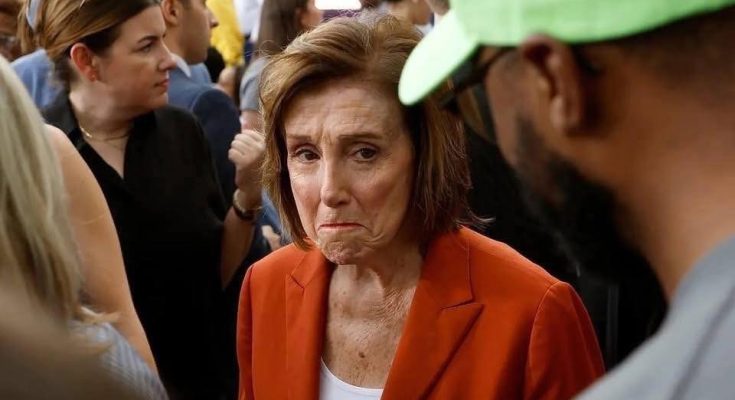Former Speaker of the House Nancy Pelosi is once again at the center of political turbulence. As she recovers from a recent hip replacement surgery, the 84-year-old congresswoman now finds herself facing a potential primary challenge from Saikat Chakrabarti — a high-profile progressive activist and former chief of staff to Representative Alexandria Ocasio-Cortez (AOC). At the same time, Pelosi’s husband, Paul Pelosi, is under renewed public scrutiny over a series of lucrative stock trades that have reignited the long-running debate over congressional insider trading.
It’s a rare convergence of health, political, and ethical pressures for one of the most enduring figures in American politics.
A New Kind of Challenger
For decades, Nancy Pelosi has been one of the most dominant and strategic power players in Washington. As the first female Speaker of the House, she led Democrats through multiple majorities and legislative showdowns, outmaneuvering presidents from both parties. But 2025 presents a different kind of test — not from across the aisle, but from within her own party.
Saikat Chakrabarti, the 39-year-old architect of some of the progressive movement’s most ambitious policy ideas, has announced his intention to challenge Pelosi in the upcoming Democratic primary. Best known for helping shape the Green New Deal alongside AOC, Chakrabarti has accused establishment Democrats of clinging to outdated politics and avoiding the bold action needed to confront issues like climate change, income inequality, and corporate corruption.
“The Democratic Party can’t keep defending the status quo while working families are struggling,” Chakrabarti said at a recent rally in San Francisco. “We need leaders who will fight for the next generation, not just preserve their own legacy.”
His campaign is expected to attract national attention — and money — from the same progressive networks that propelled AOC and other left-wing candidates to victory in recent years.
Pelosi’s Health and Recovery
Adding to the uncertainty is Pelosi’s health. Earlier this year, she underwent hip replacement surgery, which kept her out of public view for several weeks. Though her office released statements assuring the public of a successful recovery, observers have noticed her reduced schedule and limited media appearances.
At 84, Pelosi remains one of the oldest serving members of Congress. Her health — long a topic of speculation — is now emerging as a legitimate campaign issue. While she has expressed gratitude to her medical team and assured supporters that she feels “strong and capable,” questions persist about whether she can sustain another demanding campaign cycle.
Compounding the conversation is the revelation that Pelosi chose to have her procedure performed overseas, which sparked criticism from some who questioned why she didn’t seek care in the United States. Her office downplayed the controversy, stating that the decision was based on personal medical advice and should not be politicized.
Still, it adds another layer of scrutiny to a politician already navigating shifting party loyalties and growing voter impatience with aging leadership.
The Progressive Pushback
The challenge from Chakrabarti symbolizes a broader ideological divide within the Democratic Party. Progressives have grown increasingly frustrated with what they see as the establishment’s slow pace on critical reforms — from climate legislation to campaign finance reform and healthcare expansion.
Pelosi has long balanced the party’s competing factions with remarkable skill, but that equilibrium may be slipping. Her pragmatic approach, once seen as an asset, is now viewed by some as an obstacle to transformative change.
Chakrabarti’s team has already begun contrasting Pelosi’s decades in office with the urgency of modern crises. “She’s done a lot for the party,” one campaign aide said, “but at some point, experience becomes inertia.”
Still, defeating Pelosi will be an uphill battle. Her deep connections in Washington, massive fundraising machine, and longstanding loyalty from older Democratic voters give her a formidable advantage. However, the race could expose deep fractures between generations of Democrats — and between those seeking gradual progress versus revolutionary change.
Paul Pelosi and the Stock Trading Controversy
As Pelosi weighs whether to seek another term, her husband’s financial dealings have again stirred public outrage. According to financial disclosure reports, Paul Pelosi made an estimated $38 million through a series of trades in 2025, including large sales of Apple and Nvidia stock.
Critics argue that these trades, combined with new purchases of shares in Tempus AI — a company whose valuation surged shortly after his investment — raise serious questions about whether congressional families are benefitting from privileged information.
Although there is no evidence that Nancy Pelosi personally engaged in any unethical activity, the optics are politically damaging. The story feeds into a narrative that Washington insiders operate by a different set of rules, one that allows them to profit while ordinary Americans face economic hardship.
This is not new territory for the Pelosis. Paul’s stock trades have drawn criticism for years, particularly when they coincided with legislative developments affecting the companies he invested in. Calls for a full ban on congressional stock trading — including for spouses — have resurfaced, with lawmakers from both parties introducing bipartisan legislation to close loopholes.
In the past, Nancy Pelosi has expressed cautious support for such a ban, but critics argue that her position has been tepid and politically convenient. Now, with the issue once again in the headlines, she may have no choice but to take a more definitive stance.
An Uncertain Political Future
For Pelosi, the convergence of these pressures — health, family scrutiny, and internal rebellion — could define her final chapter in Congress. If she decides to run again in 2026, she will face an electorate more skeptical and divided than ever before.
Her decades of experience and record of accomplishment still command respect, even among opponents. She is credited with helping pass landmark legislation, from the Affordable Care Act to major pandemic relief packages. Her ability to control her caucus through tumultuous political climates is almost unmatched. But in the current political moment — defined by generational frustration and calls for transparency — that legacy may not be enough.
Political analysts note that even if Pelosi fends off a primary challenge, the optics of the race could damage her influence. “The symbolism of a progressive insurgent challenging Pelosi matters,” said political analyst Mara Jennings. “It signals that no one, not even the most powerful Democrat in Congress, is immune to the new political reality.”
If Pelosi opts to retire, her exit would mark the end of an era for Democratic leadership. It would also open the door for a new generation of lawmakers eager to reshape the party’s identity.
A Legacy Under Review
No matter the outcome, Nancy Pelosi’s impact on American politics is undeniable. She has been a trailblazer — the first woman to wield the Speaker’s gavel, a master negotiator, and a central figure in the Democratic Party’s evolution over the last four decades.
Yet, her twilight years in politics may prove to be her most challenging. The scrutiny surrounding her health, the persistent controversy around her husband’s finances, and the rising tide of progressive opposition together form a test that could redefine how her legacy is remembered.
As Pelosi continues her recovery, she faces a defining decision: whether to fight one last campaign to defend her seat and her record, or to step aside and let a new generation take the reins.
Either way, the months ahead will shape not only the future of Nancy Pelosi but also the direction of the Democratic Party she helped build — and the country she’s helped govern for nearly half a century.



